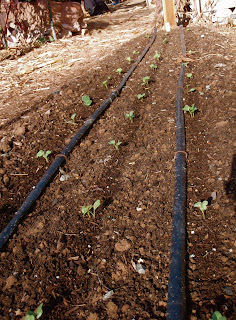Though at times I have my reservations of singing the unfiltered praises of the founding fathers of our country (as they, upon closer examination, are often not quite the same people presented to us early in our academic educations), their words do at times reveal propositions that seem to transcend the -isms associated with their time and place and offer hopeful guidance for humankind’s future.
"Whenever there are in any country uncultivated lands and unemployed poor, it is clear that the laws of property have been so far extended as to violate natural right. The earth is given as a common stock for man to labor and live on. The small landowners are the most precious part of a state."
Thomas Jefferson

Things are moving right along at Seeds At City as we make our way into fall. Summer crops such as summer squash that were no longer producing have been cleared to make room for fall and winter ones, such as broccoli, pictured here at left. It takes some TLC to start so many of our crops from seeds as opposed to planting them as starts (i.e. already sprouted in small containers, then transferred to the ground), but TLC is our specialty.
Of course, running an organic urban farm is also a lot of work. A labor of love, to be sure, but still a lot of work. Between growing a plethora of vegetables, leafy greens, fruits, grains, herbs and so on, running a weekly farmer's market, listening to and taking notes on lectures given by Paul and Julia, our resident expert organic farmers, and attending community events, our days as organic farming apprentices stay full. How, then, is such a socially beneficial, environmentally imperative, and economically revolutionary project made possible?!?!

Our volunteers. Seeing the smiling faces of our volunteers every Tuesday and Saturday from 9am to noon gets us through the days. Things can get nice and busy when a handful of volunteers show up, but on a farm, as with projects and businesses everywhere, there is always something to do. If you like weeding, we've got weeding for you. Like learning about bugs and how beneficial about 90% of them are to have around? We've got bugs galore. It's like we're running San Diego Wild Insect Park here. Even if you just like digign' in the dirt and going home sweaty and gross, feeling like you used that old bod that just sit on the couch watching the game all the time . . . no prob. We'll hook you up with a shovel and a wheelbarrow and you'll be off running.
It'll be sad to see some of the blooms of summer go, but so exciting to see the greens of winter fill in. One saying used by farmers, especially ones endeavoring to use sustainable/organic practices, is "Feed the soil, not the plant." A clever saying, and one that implies that in "feeding" (also called "amending") the soil, one in turn provides nutrients for and thereby "feeds" the plants, and of course, the plants then feed us. In industrial agriculture, the soil is often reduced to a mechanism that merely holds the plant upright in order to apply chemical fertilizers, pesticides and herbicides. Conversely, when nutrients are added to the soil using methods that act more like nature does, the soil ends up chock-full of nutrients without the potentially - or, as we're learning, certainly - harmful effects of synthetic chemical applications.

One way to amend the soil is by using manures, which is once-living matter used as fertilizer in agriculture. Green manures, specifically, are a crop grown specifically to add nutrients to the soil. After being grown, the crop is often plowed directly into the soil so it can decompose and improve soil fertility. As seen at left, buckwheat and hard winter wheat are being grown together on the Lower Slope of our farm and will be turned into the soil soon to prepare the way for the crop that will follow.
Agricultural inputs are items that are brought into the system from outside of it in order to manage and ensure productivity. Industrial agriculture, with it's high reliance on synthetically produced, chemical-based fertilizers and pesticides and fossil fuel-propelled harvesting and product transport machines, would be considered a high-input agricultural system. Nearer the other end of the spectrum would be our farm here at San Diego City College, with it's employment of fertility techniques such as composting, the use of green manures, and carefully monitored crop rotation, and additionally being an almost exclusively hand-worked farm; Seeds At City would be considered a low-input system.
Thanks for reading and hope to see you at the farm this fall!
- CR

